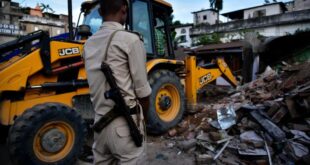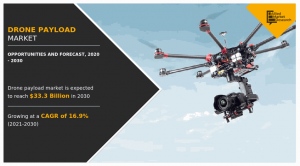Japanese drone provider Terra Drone Corporation has teamed up with Japanese telecommunications and security firms, KDDI and SECOM, to demonstrate a new drone security system that can detect and identify suspicious people at one of Japan’s largest stadiums.
Integrating Terra Drone’s drone software solutions and KDDI’s Smart Drone octocopters, the UAVs patrolled Saitama Stadium 2002, a soccer facility that seats more than 63,000 people and will be used in the 2020 Summer Olympics.
A high-altitude drone uses AI technology to identify suspicious people and calculate their location. Then, a lower-altitude drone swoops down to the person’s location and begins to record telemetry for command-center analysis and action using KDDI’s 4G LTE network.
SECOM provided security software requirements to use in the drone management system.
“The new operation management system … is not only useful for security but has been proven highly efficient for equipment inspection and could be deployed for disaster and emergency responses in the near future,” a Terra Drone press release notes.
The demonstration was part of drone research project commissioned by NEDO – a Japanese energy policy group. Dubbed Drones and Robots for Ecologically Sustainable Societies (DRESS), the initiative is designed to “encourage the development of drones and robots that can be used in sectors and fields such as logistics, infrastructure inspection and disaster [management], while also running test flights and establishing systems.”
Terra Drone specializes in commercial drone hardware, software and UTM. The company focuses on the mining, construction, energy generation, oil and gas sectors, using UAS-based LiDAR and photogrammetry surveying solutions.
The announcement comes just weeks after Terra Drone launched a joint venture with Brazilian firm Plimsoll UAV, a company that focuses on drone inspections of floating production storage and offloading system for oil and gas companies. Brazil maintains the largest number of such offloading systems in the world.
In December, Terra Drone bought a major stake in C4D Intel, an Australian company that provides drone-based spatial and temporal data acquisition, advanced data processing and decision analytics within the mining, oil and gas, power and forestry industries in Western Australia.
Jason is a longstanding contributor to DroneLife with an avid interest in all things tech. He focuses on anti-drone technologies and the public safety sector; police, fire, and search and rescue.
Beginning his career as a journalist in 1996, Jason has since written and edited thousands of engaging news articles, blog posts, press releases and online content.
Email Jason
TWITTER:@JasonPReagan
Subscribe to DroneLife here.
https://dronelife.com/2019/02/05/japanese-drone-project-can-identify-bad-guys-in-stadiums/
 Unmanned Aerial Vehicle The latest drone news
Unmanned Aerial Vehicle The latest drone news




